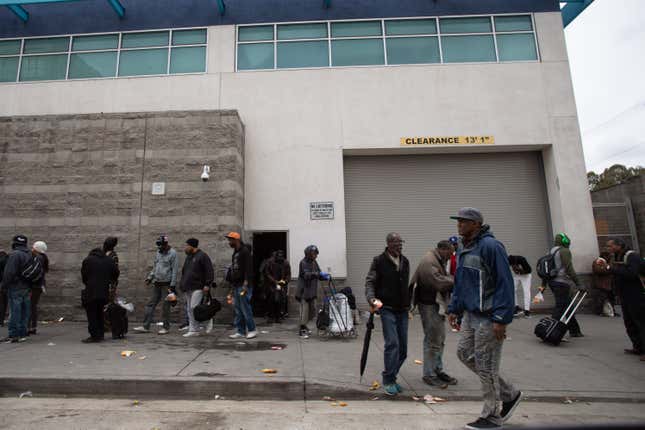
For years, a housing crisis in California has been coming to a head as skyrocketing rents have outpaced people’s wages. That crisis has led to a growing homeless population the state has struggled to assist. Now, with the coronavirus pandemic requiring Californians to “shelter-in-place,” homeless families find themselves running out of safe options.
In response, homeless families and others living in precarious situations in Los Angeles have taken part in the “Reclaiming Our Homes” movement, the Huffington Post reports. An organized group has moved into 12 homes owned by the California Department of Transportation (Caltrans) in the El Sereno neighborhood of L.A. According to reporting by the Los Angeles Times, Caltrans owns dozens more empty homes in the area.
From the Huffington Post:
The group is demanding that local and state governments take action immediately to provide housing to homeless families, which are particularly at risk of being exposed to coronavirus.
Dominque Walker, one of the organizers of Moms 4 Housing, the Oakland-based group that made headlines earlier this year when it occupied—and was subsequently evicted from—a vacant home in the Bay Area offered support to the group.
“We are all being urged to stay home and practice social distancing—but how can you do that when your family is homeless?” Walker said in a statement.
Public officials across the country have expressed concern about protecting “vulnerable populations” from COVID-19, the disease caused by the coronavirus. The term typically referred to the elderly and those with autoimmune issues, but homelessness presents unique and urgent challenges.
As The Washington Post reports:
People experiencing homelessness are increasingly older and sicker. Many have underlying health conditions but lack access to primary-care physicians or preventive health screenings. They struggle to find public bathrooms to maintain basic hygiene. Those who live in tent encampments or crowded shelters might be unable to keep their distance from others or self-isolate if they show symptoms.
Even their fiercest advocates — experts who have long served the homeless in their communities — worry about inadvertently putting their clients’ health at risk by simply showing up and doing their jobs.
Of course, homelessness isn’t just a California problem. According to the Post, one recent estimate places the U.S.’s total homeless population at 567,700. According to that paper’s analysis of Health Resources and Services Administration data, “the most underserved live in parts of the District, California, Maine, Oregon and Washington state.”
So far, efforts to help the homeless population from government officials seem woefully inadequate. Washington D.C., for example, announced it would allow homeless shelters to stay open 24 hours (they are usually open for 12), and Mayor Muriel Bowser has the authority to temporarily house homeless families for up to 60 days, the Post reports.
But shelters are ill-equipped to handle coronavirus concerns. People are typically housed in close quarters and do not have space to isolate anyone who is sick. Essential items like cleaning supplies, hand sanitizer and food are in short supply at some facilities. Shelter staff are either overworked or reduced in capacity, as volunteers are told to stay home to avoid spreading the virus.
In San Francisco, Mayor London Breed’s office plans to offer temporary housing to people who can’t self-isolate from COVID-19, including installing recreational vehicles in neighborhoods and using empty houses and vacant hotel rooms for potential quarantine housing.
Martha Escudero, a 42-year-old mother who recently moved into one of the vacant Caltrans homes, pointed out that vacant hotel rooms are inadequate in addressing longterm concerns. “Housing is a human right,” she told Huff Post.
“Skid Row used to just be downtown. Now it’s the state of California.”

